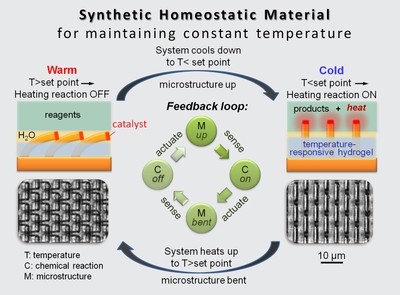A Harvard University-led engineering team has developed a materials platform dubbed as self-regulated mechano-chemical adaptively reconfigurable tunable system (SMARTS) that can be customized to maintain any preferred parameter such as pressure, wetness, temperature, and pH by responding to the changes in environment through a compensatory chemical feedback.
 Schematic of a synthetic homeostatic material for maintaining a constant temperature. (credit: Laboratory of Joanna Aizenberg, Harvard School of Engineering and Applied Sciences)
Schematic of a synthetic homeostatic material for maintaining a constant temperature. (credit: Laboratory of Joanna Aizenberg, Harvard School of Engineering and Applied Sciences)
These self-thermoregulating nanomaterials are capable of mimicking the dynamic self-powered feedback loops present in biological systems by autonomously turning on and off chemical reactions. This advancement paves the way to construct dynamic buildings that are capable of responding to the weather change to improve energy efficiency and to develop more-efficient and intelligent medical implants to maintain bodily functions. This technique also finds use in healthcare, computing and robotics. The researchers have reported their methodology in the Nature journal.
SMARTS is structurally analogous to a microscopic toothbrush comprising bristles that can lie down and stand up, which makes it to act like a switch by breaking or making contact with a chemical nutrient layer.
Co-lead author, Ximin He informed that SMARTS can be made to directly sense and change the designated stimulus without using intricate machinery or external power, thus providing an accurate, reversible and customizable platform. During its demonstration of SMARTS using temperature as the stimulus, the team embedded a nanofiber array, which contained molecular catalysts on its tip, in a hydrogel layer. The gel expanded when there was a drop in temperature, causing the nanofibers to touch the nutrient layer. Similarly, the gel contracted when there was a rise in temperature, causing the nanofibers to break contact with the nutrient layer. The important phase was the activation of heat-producing chemical reactions by molecular catalysts in the nutrient layer.
According to lead author Joanna Aizenberg, the bilayer system forms a self-regulated on-and-off switch that repeats the steps autonomously when there is a difference from the set-point. It is homeostasis at the materials level. SMARTS can also be used as an ideal ‘laboratory’ to explore the basic properties of chemical and biological systems.